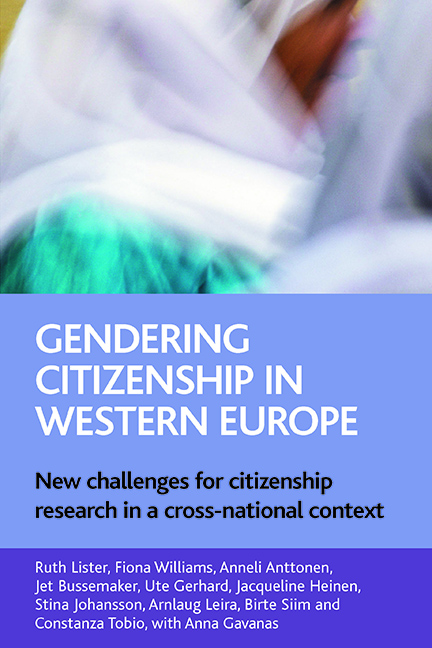 Gendering Citizenship in Western Europe
Gendering Citizenship in Western Europe five - Gendered citizenship and home-based childcare: transnational dynamics
Published online by Cambridge University Press: 15 September 2022
Summary
Introduction
The previous chapters have examined changes in the perception and application of citizenship rights in relation to childcare provision and to migration and asylum. This chapter looks at what Chapter Four called the ‘transnational redistribution of care work’ – the ways migration and childcare intersect in the case of the private employment of migrant women as domestic and childcare workers in European households. This phenomenon has been referred to as ‘the global care chain’ (Ehrenreich and Hochschild, 2003) where women from poorer regions of the world migrate to care for the children and households of employed women in the West in order to support their own children who they leave in the care of female relatives in their countries of origin. Research on the care chain in Europe has exposed the highly oppressive nature of such work and the ways in which migration rules and regimes render women vulnerable, through lack of citizenship status, to work in the underpaid and undervalued grey economy of household labour (Phizacklea, 1998; Anderson, 2000; Kofman et al, 2000; Lutz, 2002; Cox, 2006). The chapter draws on empirical qualitative research in the UK, Spain and Sweden with both employers of migrant domestic/care workers and migrant women who carry out such work. While it reinforces some of the findings of research on domestic service, it seeks to focus more on the demand for childcare services and contextualise this in terms of wider social and policy changes. The chapter starts by looking at this context and outlines the many different and complexly connected dimensions of citizenship it invokes.
Domestic work is both a new and an old phenomenon. While such work had been commonplace in bourgeois homes in Europe up until the 1960s, it fell away with the mass use of domestic technology, with the increase of alternative work in the industrial and service sectors, as well as, in the Nordic social democratic countries, a repudiation on egalitarian grounds of the very idea of employing others to provide ‘service’. By the 1990s it became evident in Western and Southern Europe that the demand for such work was on the increase again (for Britain, see Gregson and Lowe, 1994), and in the major cities it was in part migrant women from the poorer regions of the world who were meeting this demand (Anderson, 1997).
- Type
- Chapter
- Information
- Gendering Citizenship in Western EuropeNew Challenges for Citizenship Research in a Cross-National Context, pp. 137 - 166Publisher: Bristol University PressPrint publication year: 2007


